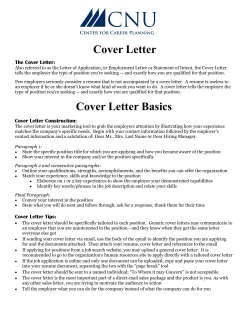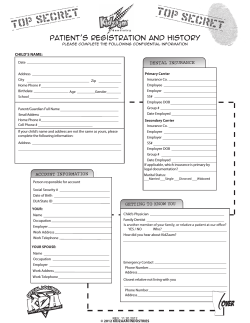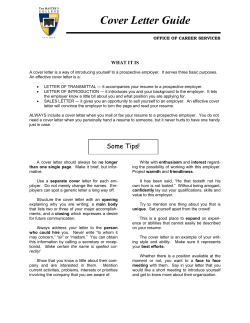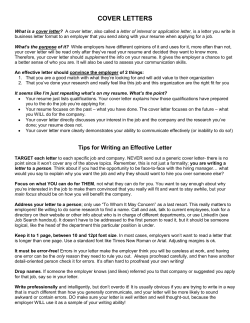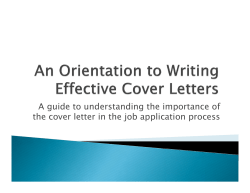
Cover Letter Guide
Cover Letter Guide A cover letter is a persuasive document that highlights the candidate’s skills, knowledge of the employer, and ability to contribute to the organization. Colgate University Center for Career Services Spear House 315.228.7380 www.colgate.edu/careerservices 1 Steps to a Successful Cover Letter Writing Step 1 – Research the information employers will expect you to know: Regarding the Career Field & Employer: ⇒ How is the employer unique? ⇒ What are its major products or services? ⇒ Whom does it serve? ⇒ What are its areas of growth? ⇒ What are the challenges and opportunities? Regarding the Employer and Career Field: ⇒ How formal is the attire, language, and etiquette? ⇒ How would you describe the working environment? ⇒ How is success measured? ⇒ What is the pace of work? Regarding the Position: Reference the job description. TIP: The comprehensiveness of job descriptions ⇒ What are the skills needed to succeed in this position? vary. Your research along with the job description ⇒ What are its main responsibilities? will be imperative to demonstrate your potential. Step 2 – Identify your past/present relevant experiences: Past performance predicts future potential. Identify two or three experiences or themes of experience that best exemplify your answers from Step 1. Describe their context and provide succinct detail using the STARR/SOARR model. Assume that your audience is unfamiliar with the experiences you cite, but will reference your resume’s bullets where more detail exists. STARR/SOARR Model Situation: Environmental conditions (differentiate of and describe the organization/situation). Task or Obstacle: What was asked or expected of you? OR What did you have to overcome? Action: What did you, not the organization, specifically do to address the task or obstacle? Result: Outcomes or impact that you had during the time that you were on task. Relate: How does this example relate to the potential opportunity you seek. Step 3 – Explicitly illustrate your potential: A cover letter should reference your past and present experiences (from Step 2) in the context of describing how they will help you perform the specific functions of the position for this unique employer (from Step 1). By focusing on the employer’s and position’s goals with specificity, blended with your background, you demonstrate your seriousness, preparation and career focus. General cover letters that do not demonstrate any knowledge of the needs or uniqueness of the employer are perceived as uninformed and weak. Step 4 – Ask for feedback on your draft: Obtain honest, constructive, and critical feedback on your draft from a career advisor or peer advisor. Your networking contacts, especially those within the position or career field, can provide guidance. Step 5 – Submit the letter with your resume and other materials indicated before the deadline. Step 6 – Follow up your application with a phone call. Contact the employer within 10 days of submitting your cover letter to ensure your application was received. Inquire about the timeframe for interviewing. 2 Cover Letter Development: Step-by-Step Step 1: Research the information employers will expect you to know: Sample Job Description: Special Events Intern, Guthrie Theater ESSENTIAL DUTIES & TASKS The Special Events Intern will support the preparation and production of large and small scale events. Responsibilities may include collecting RSVPs, assisting with guest registration and greeting, collaborating with volunteer management and day-of event coordination, participation in planning meetings, assisting with general administrative tasks, filing, mailings, donor calls, database projects, internet research and other special projects. QUALIFICATIONS The department seeks candidates who have the following attributes: detail-oriented, good discretion with confidential material, excellent interpersonal skills, diplomatic, tactful, organized, efficient, able to multi-task and adaptable to change, independent, background or strong interest in the arts, fundraising, or event production, strong writing and communication skills. Computer skills: Microsoft Office, Internet research skills, Mac proficiency. From the job description: skills/traits: ⇒ Strong organizational and project management skills (efficient, adaptable, detail-oriented) ⇒ Exceptional writing/communication ⇒ Research and office support skills ⇒ Team-orientation ⇒ Ability to maintain confidentiality and discretion with sensitive info ⇒ Interpersonal skills, friendly ⇒ ⇒ Work unsupervised, show initiative Experience/Interest in the arts From additional research: ⇒ Non-profit reliant on volunteers and fundraising to achieve goals (entire team dedicated to that) ⇒ Employer presents itself professionally ⇒ Theater produces many shows in a season: the pace is fast. Step 2: Identify past/present relevant experiences. Describe them in STARR/SOARR Where have I done this? (What skill/trait does it show?) ⇒ Developed excellent grammar and syntax as an Classics major (communication skills) ⇒ Experience in college theater production reviewing scripts (interest and understanding of the arts, theater; ability to balance school and extracurriculars in a busy calendar; team orientation) ⇒ Appointed treasurer to the STG (Student Theatre Group) - a new student group - organized the budget for the first show (organization, project management, initiative) ⇒ Helped raise all money for sorority’s philanthropy (understanding of non-profits, ability to fundraise) Student Theater Group Experience for STARR/SOARR S: I am the treasurer of the STG, a new theater group. As a new group, we lacked an existing budget. O: For our first major show, the cost of production was estimated to be higher than STG’s budget A: I organized and implemented a theater showcase fundraiser through minimal costs. I managed a lot of different responsibilities. We also had to do it in a short amount of time. R: We raised enough to cover production. I also learned a great deal about event planning and fundraising. R: Our production hinged on the success of our fundraising and this showcase, similar to the Guthrie Theater. It was team-oriented similar to the work of the special events team. I did the grunt work, and glamorous pieces. I did this in the context of supporting the arts. SEE STEP 3 —THE FULL COVER LETTER — ON PAGE 6 3 Cover letters are one page, single-spaced. Standard business format is used: 1” margins; Times New Roman, Times, or Arial font, sized 10, 11 or 12 The Anatomy of a Cover Letter Your street address City, State Zip Code Date Contact Name Title Employer Street Address City, State Zip Code Dear Mr/Ms. _______: The opening paragraph should pique the employer’s curiosity by stating enthusiastically why you are pursuing the organization. You should name the position and tell how you became aware of the opportunity. If you were referred by someone, or networked with someone extensively who would be relevant to the employer, mention that person’s name. This paragraph should encourage the employer to want to read more. Reveal your knowledge of how you would fit within the unique environment of the employer and industry. Finish your paragraph as if you are writing a thesis statement for the rest of the letter. Briefly cite the specific highlights of the body paragraphs you will discuss in greater detail. The most effective middle paragraph(s) articulate specific examples of how your past experiences will be applicable to excelling in the position you seek. Provide concrete examples that outline your specific qualifications, skills, or accomplishments that match the job description. These will likely be past or current academic, extracurricular, work related or personal experiences. Refer to the key aspects of your resume, but avoid restating your resume’s descriptions. Additionally, if your relevant personal qualities are not obvious from your resume, this is your opportunity to discuss them. Close your letter with a strong indication of your desire to work for this organization. You should request an interview and indicate that you will follow up to discuss this possibility. Note that your resume is enclosed. Include your contact information (phone number and email). Close the letter by thanking the employer. Sincerely, (signature here) Your typed name 4 Best Practices for Cover Letters DO… ⇒ Customize your letter for the position. It is the writer’s responsibility, not the reader’s, to connect your experience to the employer’s needs. ⇒ Write concisely, formally, and keep your writing focused. Your letter should not exceed one page. ⇒ Address your cover letter to a specific person. If the contact is not provided, call the employer to secure the information, unless the employer specifically asks candidates not to call. ⇒ Provide your contact information (phone number and email) in the closing paragraph or below your signature. ⇒ Have several people proofread your letter to ensure it is error free. ⇒ If sending your cover letter and resume via email, attach both documents separately as PDFs that include your name. Provide a brief sentence in the body of your email that indicates your purpose and refers to the attached documents. ⇒ If submitting via email, provide an email subject that is relevant to the information: write the position title, your name, and date as the email subject (Production Assistant-Jane Doe, 10-25-2014). ⇒ If sending a hard copy, print your letter using white or cream bond paper. ⇒ Sign your signature in black or blue ink. ⇒ If you will be abroad when interviewing will occur, reference the best method of contacting you and emphasize your willingness to call for a phone interview, or to interview before your departure. ⇒ Follow up with the employer within 10 days of sending your cover letter. DO NOT… ⇒ Mass-produce your cover letter. Generic cover letters are obvious and will not be impressive. ⇒ Provide a list of accomplishments without articulating their connection to the employer’s needs. ⇒ Send your materials to “To Whom It May Concern” or “Director of Human Resources” unless no other option exists. ⇒ Overstate your accomplishments. Expect employers to research you. ⇒ Use contractions, slang, abbreviations, or other casual language. ⇒ Use “Mrs.” in the salutation. Always opt for “Mr.”, “Ms.”, or “Dr.” (Last name). If you are unsure of the contact’s gender, use Dear (Full name). 5 Example 1 Date Contact’s Name Guthrie Theater Street Address City, State zip code Dear Mr. X: It is with great enthusiasm that I am applying for the Special Events internship posted through Colgate University’s Career Services. I am highly motivated and possess a solid understanding of theater administration and polished communication skills. It would be incredible to work in support of the department of special events for the Guthrie Theater, especially in the context of your fast-paced production schedule. My proven experience in event coordination and fundraising for my college’s new, unfunded, theater group speaks directly to my potential to exceed expectations as a member of the special events team. As Treasurer I led our membership to organize and implement a theater showcase that raised nearly $3000—the amount needed to support the cost of our upcoming production of Othello. My work minimized the showcase’s costs by using second-hand costumes, scenic designs, and creating my own promotional materials. There was no task too small or complex that I didn’t tackle. This experience required me to balance a multitude of important elements, yet, I gained great perspective of the complexity and necessity for effective event planning. I would bring this same dedication and drive to my work with the Guthrie Theater where similarly, event facilitation is key to the ability to support your productions. In studying Classics at Colgate, I have challenged myself to developing strong writing, research and analysis skills. I am accustomed to producing polished writing through independent processes under short timeframes. I am certain that in working for Guthrie Theater the rigor of my coursework will assist me to produce publicity and internal communications with little direction. I know I will be able to contribute immediately to the success of the events team. Please find enclosed my resume, which I hope you will consider. I will be in contact with you to discuss the potential of interviewing and to learn more about this opportunity. Feel free to contact me if you have questions or concerns at (315) XXX-XXX or student@colgate.edu. Respectfully yours, (Handwrite your signature in cursive if sending a hard copy) Candidate’s name Candidate’s street address City, State, zip code 6 Example 2 Candidate’s street address City, state, zip code Date Employer Employer’s title Employer’s street address City, State zip code Dear Ms. X: Please accept the submission of my resume for a Sales and Trading Analyst position with ABC Company. I have been encouraged to apply after speaking with your on campus recruiter at Colgate University. Through my past internship in finance, I have gained considerable research experience and quantitative analysis skills; additionally, my coursework and campus activities have provided me with the sharp analytical skills necessary to succeed in the challenging, fastpaced environment of the Sales and Trading. My potential to make an immediate impact stems from my internship at 123 Corporation. I researched airlines and shipping companies to determine how they hedged their risk of fluctuation in interest rates, oil prices, and foreign exchange rates. The derivative sales team then used the information I found to advise clients in these particular industries. This experience was particularly rewarding as it was my first significant exposure to sales and trading, and sparked my interest in the field. I will utilize the knowledge and skills I obtained from this experience to apply them to the dynamic environment of ABC Company. As the treasurer of Brothers, a student organization supporting students of color at Colgate, I learned to think on my feet, make sound fiduciary decisions, and work collaboratively meet our organization’s goals. This experience has given me an opportunity to sharpen and demonstrate these essential traits needed to thrive within the culture of sales and trading. Thank you very much for your consideration. I look forward to hearing from you, and can be contacted by email at xxx@colgate.edu, or by telephone at xxx-xxx-xxxx. Sincerely, Candidate’s name 7
© Copyright 2025

